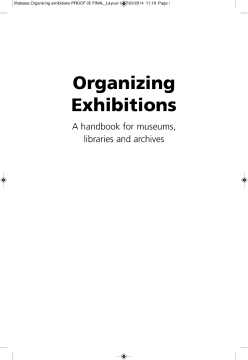
Additional Information
Book Details
Abstract
This ground-breaking book is the first to provide museum staff, librarians and archivists with practical guidance on creating and organizing successful exhibitions.
Drawing on international museum practice but applicable to any exhibition or display, the book sets out a time-line from the initial idea to the final legacy. Backed up by advice and guidance and with a list of resources for those who require in-depth knowledge, it has up-to-date information on new developments such as sustainability and flexibility in environmental conditions. Also included are the ten biggest mistakes and the top ten tips for exhibition success.
Part One covers the 10 key stages for a successful exhibition: idea, planning, organization, packing and transport, installation, openings, maintenance and programmes, closure, touring, and legacy. Part Two is a directory of advice and resources, supplementing the information provided in Part One.
Readership: Written by an international expert and designed for the first-time exhibition organizer as well as the professional, this book will become the standard for exhibition success. Recommended for museum staff, cultural heritage students, librarians, archivists, private collectors and anyone who needs practical guidance on organizing exhibitions.
Freda Matassa FRSA MA(Hons) DipAL DipEd is a wellknown UK expert on collections management who advises, teaches and lectures internationally. Former Head of Collections Management at the Tate Gallery and co-founder of the European Registrars Conference, she is expert adviser on several European projects for museum standards and to the Minister of Culture on immunity from seizure. She was recently named one of the Top 50 Women to Watch in the arts and is the author of Museum Collections Management (Facet, 2011).
This ground-breaking book is the first to provide museum staff, librarians and archivists with practical guidance on creating and organizing successful exhibitions. Drawing on international museum practice but applicable to any exhibition or display, the book sets out a time-line from the initial idea to the final legacy. Backed up by advice and guidance and with a list of resources for those who require in-depth knowledge, it has up-to-date information on new developments such as sustainability and flexibility in environmental conditions. Also included are the ten biggest mistakes and the top ten tips for exhibition success. Part One covers the 10 key stages for a successful exhibition: idea, planning, organization, packing and transport, installation, openings, maintenance and programmes, closure, touring, and legacy. Part Two is a directory of advice and resources, supplementing the information provided in Part One. Written by an international expert and designed for the first-time exhibition organizer as well as the professional, this book will become the standard for exhibition success. Recommended for museum staff, cultural heritage students, librarians, archivists, private collectors and anyone who needs practical guidance on organizing exhibitions.
"Organizing Exhibitions is a thorough work and key procedures are well covered...The detailed ‘step by step’ approach, supported by the sample documentation, provides an excellent grounding that can be easily adapted to a number of circumstances."
Archives and Records
There are a number of textbooks available to give practical advice about museum practice and the creation of exhibitions. However, this book by Freda Matassa is one of the clearest and easiest to read publications for those who have little experience in setting up an exhibition.
Claire Marsland
Catholic Archives
"International lecturer Freda Matassa (former Head of Collections Management at the Tate) presents Organizing Exhibitions: A Handbook for Museums, Libraries and Archives, an in-depth reference and resource for museum staff, librarians, and archivists. Chapters discuss how to take space, audience, and budgetary constraints into account; offer point-by-point checklists for each stage of creating the exhibit; outline concerns for opening day; highlight specific issues for an exhibit on tour; and much more...It also lends credibility to the organization and demonstrates professional practice. Organizing Exhibitions is a "must-have" for aspiring and practising professionals, and highly recommended."
Midwest Book Review
